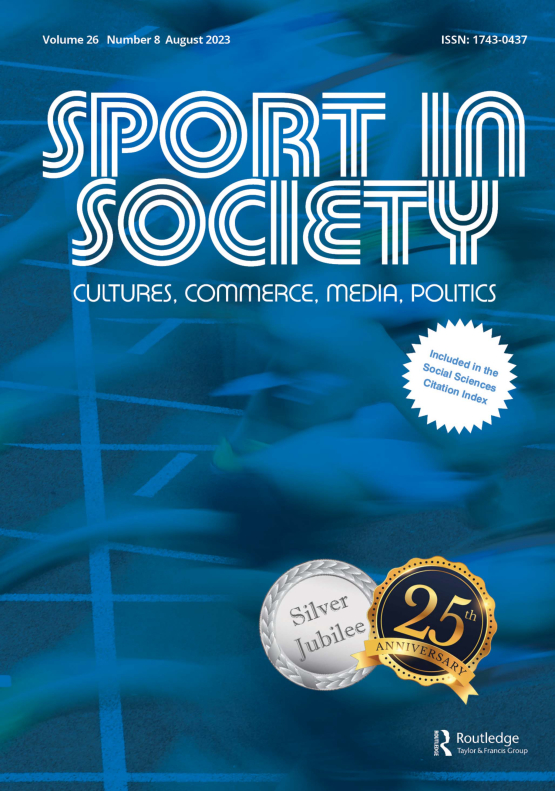Submit a Manuscript to the Journal
Sport in Society
For a Special Issue on
Sport, Business and Society
Abstract deadline
30 April 2024
Manuscript deadline
31 July 2024

Special Issue Editor(s)
Distinguished Professor Vijay Pereira,
NEOMA Business School, Paris
[email protected]
Dr Boria Majumdar,
Distinguished Adjunct Professor, School of Modern Media, UPES
[email protected]
Sport, Business and Society
Sport, Business and Society Conference
Sponsored by Sport in Society (Taylor & Francis) and NEOMA Business School, France
Hosted by ‘The World We Want’ Area of Excellence Group, NEOMA Business School, Paris, France
25th to 27th August 2024
Chairs: Professor Vijay Pereira and Dr Boria Majumdar
The primary objective of this conference, the first of its kind, is to solicit, assemble, and expand the innovative but diffused research from across the world on the intersection of three broad topics i.e., sport, business, and society. Scholarship on the social impact and extent of business in sport is rare but acutely necessary owing to the greater intensification and diversification of the forms of sport-business nexus. Based on a strong understanding of extant literature, we have identified several interdisciplinary research areas and topics (questions/ problems) pertaining to sport’s sociological and ethical dimensions that illustrate this link. These include public-private divides in global governance and sports management, corporate responsibility, social protest and boycott, sportswashing, and sustainability, to name a few.
- Most of the sports leagues were created with a clear agenda of building and supporting a specific sport. Nonetheless, as their popularity grew, they generated increasing concerns regarding the involvement and behaviour of key stakeholders. They raise the following questions: How does the government benefit from such sporting events and why should they continue to support sporting bodies? What if the generated revenue was spent for greater good of the society? Is there legitimacy, ethics and fairness in organizing these sports events? (De Waegeneer, Van De Sompele & Willem, 2016).
- Sport on the one hand creates business, which in turn provides economic growth to a society and a nation. On the other hand, encouraging sports through business also makes a fitter and healthier society. Sport involves a multitude of stakeholders (namely, sports authorities and organizers, governments at all levels, financial partners, players from different national and geographical states and ethnic backgrounds, broadcasting media and spectators, international sport agencies, athletes etc.). Hence, in the past few decades, the interest and demand of business in sports and vice versa has increased (Russo & Figueira, 2022).
- Although societies benefit from partnerships developed by sport businesses, unequal power relations remain a key concern (Levermore, 2010). Since a small number of businesses are involved with national and international sporting bodies, power lies in the hands of a few. Links with government officials often result in nefarious activities. Additionally, such partnerships are largely undergirded by family businesses that depend on the involvement of family members for success. As a business, sport involves extensive networking to create value (Ratten, 2021). Since sports and business are gaining popularity, many youngsters opt for management studies in sports. Seifried et al. (2021), for example, provides recommendations to improve and strengthen sports management courses to provide strong foundations of management to students.
- A study conducted by Babiak & Kihl (2018) put forward the opinion that all stakeholders agreed that sport organizations had an obligation towards the society and community and were expected to engage in CSR activities. Research based on the London 2012 Olympic Games concluded that CSR relationships can be fruitful when targeted at the right audience at the right time (Dowling, Robinson & Washington, 2013). A similar pattern was followed by Beijing in 2022, when the Winter Olympics led to urban transformation despite the city’s lack of winter sport tradition (Xin & Kunzmann, 2020). Any sporting mega event creates local employment and infrastructure in the city apart from generating revenue from tourists. Therefore, with increased financial opportunities, sport businesses must balance their core values, economic interests, and social considerations (Cockayne, 2021). Additionally, branding and marketing at sport events raise concerns regarding sponsors such as tobacco companies, which through their funding and marketing, promote unhealthy living habits, especially amongst the younger generation (Levermore, 2010). Hence, the question arises, what can both business and sport do to collectively to behave more responsibly?
The above four directions are not exhaustive, but only indicative of the research we look to solicit for this conference. Potential topics for papers could include, but are not limited to:
- Human resource management
- Legacy management
- Leveraging sports celebrities
- Managing social responsibility
- Pricing of experience
- Social protests and boycott
- Sport volunteers
- Sportswashing
- Strategic communication
- The ethics of expenditure
- The nonprofit sector
Looking to Publish your Research?
Find out how to publish your research open access with Taylor & Francis Group.
Choose open accessSubmission Instructions
300-word abstracts for 20-minute paper presentations, along with a 100-word author biography, should be sent to Daicy Vaz ([email protected]) and Souvik Naha ([email protected]) by 30th April 2024.
Authors whose abstracts are accepted will be notified by 15th May 2024.
Selected papers will be published in a special issue of Sport in Society.